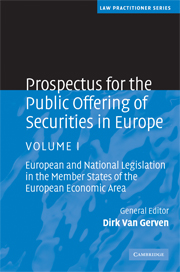 Prospectus for the Public Offering of Securities in Europe
Prospectus for the Public Offering of Securities in Europe Published online by Cambridge University Press: 18 December 2009
When offering securities to the public or requesting the admission of securities to trading on a regulated market in the European Union, the offeror or entity requesting admission must prepare a prospectus providing information about the securities being offered and the issuer. When securities are offered to the public, national law requires that the prospectus be reviewed and approved by the national financial supervisory authority. Until recently, the rules in each Member State were quite different, meaning that deciding on which market to offer securities, or request admission to trading, required a detailed comparative study. Furthermore, a simultaneous offering in several Member States entailed the application of different rules and approval of the prospectus by several supervisory authorities. In order to unify these rules and designate a single competent authority to approve prospectuses, the Council adopted the Prospectus Directive on 4 November 2003. The deadline for transposition of this directive into national law by the Member States was 1 July 2005. All Member States, including Bulgaria and Romania, have adapted their national legislation accordingly.
The main achievements of the Prospectus Directive are without a doubt (i) harmonisation of the applicable rules; (ii) the designation of a single competent authority to approve prospectuses; and (iii) the introduction of a European passport, allowing the same prospectus to be used throughout the European Union and the European Economic Area without new approval in each Member State being required.
To save this book to your Kindle, first ensure [email protected] is added to your Approved Personal Document E-mail List under your Personal Document Settings on the Manage Your Content and Devices page of your Amazon account. Then enter the ‘name’ part of your Kindle email address below. Find out more about saving to your Kindle.
Note you can select to save to either the @free.kindle.com or @kindle.com variations. ‘@free.kindle.com’ emails are free but can only be saved to your device when it is connected to wi-fi. ‘@kindle.com’ emails can be delivered even when you are not connected to wi-fi, but note that service fees apply.
Find out more about the Kindle Personal Document Service.
To save content items to your account, please confirm that you agree to abide by our usage policies. If this is the first time you use this feature, you will be asked to authorise Cambridge Core to connect with your account. Find out more about saving content to Dropbox.
To save content items to your account, please confirm that you agree to abide by our usage policies. If this is the first time you use this feature, you will be asked to authorise Cambridge Core to connect with your account. Find out more about saving content to Google Drive.